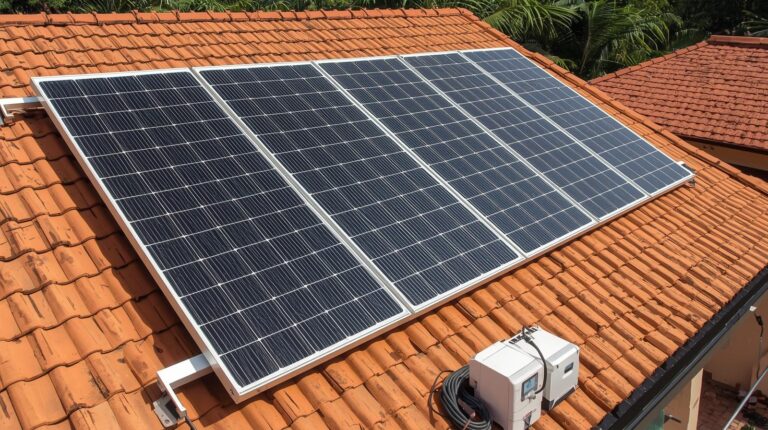You’re about to discover the remarkable benefits of solar power grid integration. By harnessing the sun’s energy, you’ll experience increased efficiency, enhanced stability, and significant cost savings.
As you reduce carbon emissions, you’ll contribute to a greener future. Moreover, your reliability and resilience will improve, ensuring a constant and dependable energy supply.
Get ready to join a community of forward-thinking individuals who are revolutionizing the way we power our world.
Key Takeaways
- Increased energy efficiency through energy conservation and sustainable development practices
- Enhanced grid stability by allowing for the efficient integration of renewable energy sources
- Cost savings and financial incentives, including potential energy independence
- Reduced carbon emissions, mitigating climate change
Increased Energy Efficiency
By integrating solar power into the grid, you can significantly increase your energy efficiency. This is achieved through energy conservation and sustainable development practices.
Solar power is a clean and renewable energy source that helps reduce dependency on fossil fuels. When solar power is integrated into the grid, it allows for the efficient distribution of electricity to homes and businesses. This reduces transmission losses and ensures a more reliable energy supply.
Additionally, solar power can be stored in batteries for later use, further optimizing energy efficiency. By adopting solar power grid integration, you contribute to a more sustainable future by reducing greenhouse gas emissions and promoting a cleaner environment.
This not only benefits you economically but also helps create a sense of belonging to a community that values sustainable development.
Enhanced Grid Stability
To enhance grid stability, integrating solar power into the grid ensures a more reliable and resilient energy supply. This integration is a crucial step towards grid modernization, as it allows for the efficient and seamless integration of renewable energy sources.
Here are three key advantages of integrating solar power into the grid:
- Increased grid flexibility: Solar power can be generated and consumed locally, reducing the strain on transmission lines and enhancing the overall stability of the grid.
- Improved voltage regulation: Solar power systems can help regulate voltage fluctuations and maintain a steady power supply, reducing the risk of blackouts and voltage surges.
- Enhanced grid resilience: Solar power integration reduces dependence on traditional fossil fuel-based energy sources, making the grid more resilient to disruptions and ensuring a constant supply of electricity.
Cost Savings and Financial Incentives
When integrating solar power into the grid, you can take advantage of various cost savings and financial incentives. One major benefit is the potential for energy independence. By generating your own electricity through solar power, you reduce your reliance on traditional energy sources and can become more self-sufficient. This not only helps to lower your energy bills but also provides a sense of security knowing that you have control over your energy supply.
Additionally, integrating solar power into the grid can lead to job creation. The solar industry has seen significant growth in recent years, and as more solar installations are added to the grid, more jobs are created. This includes jobs in manufacturing, installation, maintenance, and research and development. These job opportunities can help stimulate the local economy and provide employment opportunities for individuals seeking a career in the renewable energy sector.
Reduced Carbon Emissions
Integrating solar power into the grid reduces carbon emissions, promoting environmental sustainability and combating climate change. This transition to renewable energy sources has a significant positive environmental impact.
Here are three reasons why reduced carbon emissions matter:
- Mitigating climate change: By reducing carbon dioxide emissions, solar power integration helps to slow down global warming and mitigate the impacts of climate change. This is crucial for the long-term well-being of our planet.
- Improving air quality: Solar power is a clean energy source that doesn’t produce harmful pollutants such as sulfur dioxide, nitrogen oxide, or particulate matter. By reducing the reliance on fossil fuels, solar power integration contributes to cleaner air and healthier communities.
- Preserving natural resources: Solar power is a renewable energy source that harnesses the sun’s energy, which is abundant and freely available. By utilizing solar power, we can reduce the consumption of finite resources like coal, oil, and natural gas.
Embracing solar power integration isn’t just about reducing carbon emissions; it’s about creating a sustainable future for generations to come.
Improved Reliability and Resilience
By integrating solar power into the grid, you can experience improved reliability and resilience in your energy supply. Grid modernization and renewable energy integration are key factors in achieving this.
Solar power provides a decentralized energy source that reduces the risk of power outages and enhances the overall stability of the grid. When traditional power generation sources face disruptions, solar power can continue to produce electricity, ensuring a continuous energy supply.
Furthermore, solar power can enhance the resilience of the grid during natural disasters or emergencies, as it is not dependent on external fuel sources. To illustrate the benefits, consider the following table:
| Improved Reliability and Resilience | ||
|---|---|---|
| Decreased vulnerability to outages | Enhanced stability of the grid | Reduced dependence on external fuel sources |
Conclusion
So, if you’re considering integrating solar power into the grid, you’re making a wise choice. By doing so, you’ll not only increase energy efficiency but also enhance grid stability.
Additionally, you’ll enjoy cost savings and financial incentives while reducing carbon emissions. Moreover, solar power integration will improve the reliability and resilience of the grid, ensuring a more secure energy future.
Embracing solar power is like adding a ray of sunshine to the grid, brightening the path towards a sustainable and efficient energy system.



